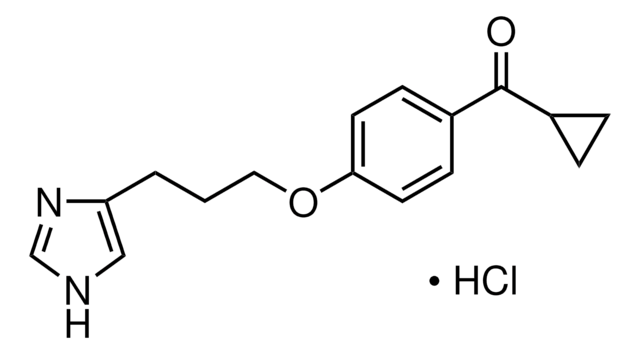J3770
JNJ7777120
≥98% (HPLC)
Synonym(s):
1-[(5-Chloro-1H-indol-2-yl)carbonyl]-4-methyl-piperazine
About This Item
Recommended Products
Quality Level
Assay
≥98% (HPLC)
form
solid
color
white to off-white
solubility
DMSO: >20 mg/mL
H2O: insoluble
originator
Johnson & Johnson
storage temp.
room temp
SMILES string
CN1CCN(CC1)C(=O)c2cc3cc(Cl)ccc3[nH]2
InChI
1S/C14H16ClN3O/c1-17-4-6-18(7-5-17)14(19)13-9-10-8-11(15)2-3-12(10)16-13/h2-3,8-9,16H,4-7H2,1H3
InChI key
HUQJRYMLJBBEDO-UHFFFAOYSA-N
Application
- to study its effects on the pro-inflammatory microglia in rats
- to study its effects on the Parkinson′s-like pathology in rat brain
- to study its effects on the histamine receptor interaction in periodontal ligament fibroblasts (PDLF)
Biochem/physiol Actions
Features and Benefits
Signal Word
Warning
Hazard Statements
Precautionary Statements
Hazard Classifications
Eye Irrit. 2 - Skin Irrit. 2 - STOT SE 3
Target Organs
Respiratory system
Storage Class Code
11 - Combustible Solids
WGK
WGK 3
Flash Point(F)
Not applicable
Flash Point(C)
Not applicable
Personal Protective Equipment
Certificates of Analysis (COA)
Search for Certificates of Analysis (COA) by entering the products Lot/Batch Number. Lot and Batch Numbers can be found on a product’s label following the words ‘Lot’ or ‘Batch’.
Already Own This Product?
Find documentation for the products that you have recently purchased in the Document Library.
Our team of scientists has experience in all areas of research including Life Science, Material Science, Chemical Synthesis, Chromatography, Analytical and many others.
Contact Technical Service









